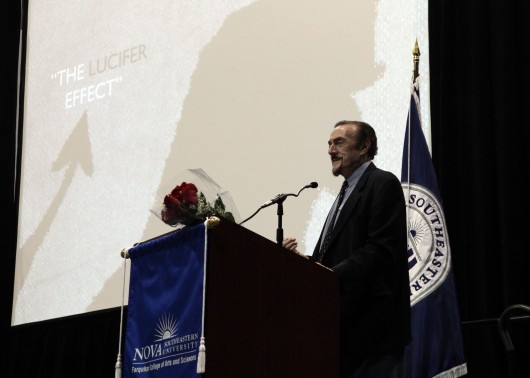NSU Newsroom
SharkBytes
Horizons
This version of NSU News has been archived as of February 28, 2019. To search through archived articles, visit nova.edu/search. To access the new version of NSU News, visit news.nova.edu.
This version of SharkBytes has been archived as of February 28, 2019. To search through archived articles, visit nova.edu/search. To access the new version of SharkBytes, visit sharkbytes.nova.edu.
Renowned Psychologist Philip Zimbardo Speaks at NSU, Urges Heroism to Triumph Evil

Renowned psychologist Philip G. Zimbardo, Ph.D., spoke to more than 800 students, faculty members, and guests at NSU on Apr. 15.
The Farquhar College of Arts and Sciences Division of Social and Behavioral Sciences welcomed renowned psychologist Philip G. Zimbardo, Ph.D., professor emeritus of psychology at Stanford University, to NSU as part of the college’s Distinguished Speakers Series on Apr. 15. Speaking to a group of more than 800 students, faculty members, and guests, Zimbardo presented “The Lucifer Effect: Understanding How Good People Turn Evil,” named after his best-selling book of the same title.
In his talk, accented by a collection of pictures, video, music, and sound effects, Zimbardo explored the belief that situations, not dispositions, can cause ordinary people to commit extraordinarily evil acts. This is the primary idea behind Zimbardo’s famous Stanford Prison Experiment of 1971, in which a group of 24 student volunteers were divided, 12 named “prison guards” and the others “prisoners,” and placed in a functional, yet simulated, prison environment, constructed in the halls and surrounding “yard” of the Stanford Psychology Building.
Prior to Zimbardo’s visit, on Apr. 12, the Division of Math, Science, and Technology presented “DNA Evidence: Separating Good from Evil,” a panel examining of the use of DNA evidence in crime laboratories. In the United States, some innocent people are convicted of crimes, and some guilty people are released. DNA evidence has lessened these injustices in recent years. Panel members included Jason Gershman, Ph.D., assistant professor and coordinator of mathematics in the college’s Division of Math, Science, and Technology, and George Duncan, Ph.D., criminalist unit manager for the Broward County Sheriff’s Office.
Also a companion event to Zimbardo’s keynote talk was the final installment of the college’s annual Faculty Lecture Series. Stephen Levitt, LL.M., associate professor in the college’s Division of Humanities, concluded the series on Apr. 13 with “Visions of Prussia: Good and Evil.” In his presentation, Levitt explored Prussia’s traditions, values, accomplishments, and positive legacies.
For more information on the Distinguished Speaker Series, visit www.fcas.nova.edu/articles/dss.
Photos from this Distinguished Speakers Series event are now available online in the gallery.